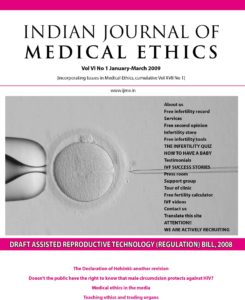
The World Medical Association Declaration of Helsinki represents an international standard for ethical guidelines in medical research. For more than a decade, it has also been the centre of controversy. The latest revision took place in October 2008. An editorial in this issue of the journal comments on the latest revisions. Many of the changes are particularly important in the context of growing company-sponsored research in developing countries, or “clinical trials tourism”.
Reproductive tourism is in the news. People travel to India to commission a baby and doctors become brokers in surrogacy arrangements. Is renting a womb different from selling an organ? It is, if one accepts the logic of the draft Assisted Reproductive Technology (Regulation) Bill, 2008. Three commentaries on the draft Bill represent different perspectives on the subject. They are united in their concern that the draft Bill promotes the interest of providers rather than women who undergo these procedures, and actively promotes reproductive tourism in India.
In 2007, the World Health Organization declared that male circumcision was a proven effective and safe method to reduce HIV transmission. However, the Indian government has remained silent on the topic, arguing that it could be communally provocative. Another editorial discusses the responsibility of health care providers to inform their patients of the risks and benefits of the procedure.
In 2007, the World Health Organization declared that male circumcision was a proven effective and safe method to reduce HIV transmission. However, the Indian government has remained silent on the topic, arguing that it could be communally provocative. Another editorial discusses the responsibility of health care providers to inform their patients of the risks and benefits of the procedure.
The mass media can play a role in promoting public discussion on medical ethics issues. Another paper analyses the coverage of medical ethics in two major Indian newspapers and concludes that both the research community and the media need to focus more on the subject.
